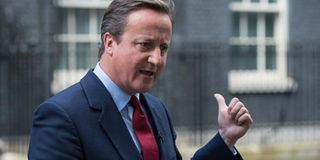Why the English voted to leave European Union

David Cameron made the worst blunder of his political life when he unwisely promised the English that they would be given opportunity to vote in a referendum whether or not to stay in the European Union
What you need to know:
The English who are more numerous than the combined populations of the other three consider themselves superior, not only to their British compatriots, but to all other races of the world. Whether in or out of England, the English regard all other non-English people as foreigners. The English manners and utterances suggest that during and after creation, the English were placed first and issued with first class tickets in the affairs of mankind.
Prof George W. Kanyeihamba
If the June referendum held in the UK had been in Uganda or any other underdeveloped country, the voters would have believed former prime minister David Cameron, Labour Party leader Jeremy Corbyn and all the big political guns who had passionately campaigned for Queen Elizabeth II’s realm and other territories to remain in the European Union and voted in favour by well over 90 per cent of the votes cast.
Unfortunately for Europe and Britain, in mature and enlightened democracies, political decisions are often taken by voters against the advice and pleas of politicians. Cameron made the worst blunder of his political life when he unwisely promised the English that they would be given opportunity to vote in a referendum whether or not to stay in the European Union.
He totally forgot that in referenda, voters are concerned and pass judgment on more issues than the simple ones posed by the organisers of the referendum. It is true that immigration and the economy of the UK were relevant issues but were not the only ones that worried the voters.
In a referendum, voters consider and are swayed by many other matters and principles weightier than those envisaged in the referendum questions. For instance, the Scottish voters were not so much concerned with immigration or the economy as they were by the possibility of being in Europe that would help them eventually attain independence from the English. They, therefore, voted to stay in Europe.
The Northern Ireland voters were not so much concerned about the UK’s sovereignty as they were about staying in Europe as a further guarantee against the plans of the Irish nationalists who continue to campaign for a United Irish Republic.
The results showed that, apart from the capitals of the regions, London and Cardiff where economic worries predominated all other reasons, the overwhelming population of England and Wales, who constitute the majority voters of the UK, voted massively to abandon the European Union.
The reasons for the rejection of Europe as a partner with the possibility of a political and cultural union may be complex. However, it is important to know the character and beliefs of the English and Welsh people and contrast them with those of the people of Continental Europe, especially the German and the French.
This is not merely a reference to the BBC comical episode in “Yes Prime Minister” where the permanent secretary remarks that it is not the Russians but the French who have always been and remain the enemies of Britain, but the causes of the resentment of the Britons against the Europeans are much more serious and deep rooted.
In chapter 8 of my book The Blessings and Joy of Being Who You are, I enumerate and describe the tribes who inhabit the British Isles, namely the English, the Welsh, the Scots and the Irish. The English who are more numerous than the combined populations of the other three consider themselves superior, not only to their British compatriots, but to all other races of the world.
Whether in or out of England, the English regard all other non-English people as foreigners. The English manners and utterances suggest that during and after creation, the English were placed first and issued with first class tickets in the affairs of mankind.
In a humorous conversation between an Englishman and a Jew, the latter proudly remarked, “I wish to remind you that Jesus Christ you Christians revere and worship was a Jew” to which the Englishman pompously retorted, “And I wish you to know that God, Almighty, is an Englishman”.
The problem of the European Union for the average Englishman is that from the inception and for more than 40 years it has been lead and dominated by the Hun, the German, and the Frog, the French.
The referendum gave the prejudiced English bigots and their Welsh cousins the opportunity to say, as their late English Iron Lady, former prime minister Margaret Thatcher, once said to all inferior humans running the European Union, “NO! NO! NO!”
Incidentally, the referendum was held at a time when all the main political parties in the land were unpopular. Many voters in the referendum were passing judgment on the parties and the UK ruling establishment.
All things equal, political leaders and their parties should only contemplate using referenda when they and their policies are exceedingly popular or when they are in the happy environment where they can rig the results in favour of what they desire to happen as in many African states.
Following the referendum, many who voted to leave realised too late the undesirable consequences and begun regretting. To add insult to injury, the English football team which was one of the favourites to win the European Cup lost to the tiniest and least fancied teams of one of the minutest countries in the world, Iceland.
Prof Kanyeihamba is a retired Supreme Court judge. [email protected]




